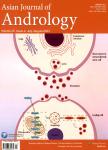Younger patients have poorer biochemical outcome after radical prostatectomy in high-risk prostate cancer
Younger patients have poorer biochemical outcome after radical prostatectomy in high-risk prostate cancer作者机构:Department of Urology Seoul National University Bundang Hospital Seongnam Kyunggi-do 463-707 Korea
出 版 物:《Asian Journal of Andrology》 (亚洲男性学杂志(英文版))
年 卷 期:2011年第13卷第5期
页 面:719-723页
核心收录:
学科分类:090603[农学-临床兽医学] 0710[理学-生物学] 07[理学] 08[工学] 09[农学] 0906[农学-兽医学] 071007[理学-遗传学] 0901[农学-作物学] 0836[工学-生物工程] 090102[农学-作物遗传育种]
主 题:age factors biochemical outcome prostate prostatic neoplasms prostatectomy
摘 要:The aim of this study was to investigate the prognostic significance of patient age with respect to tumour aggressiveness in men who underwent radical prostatectomy (RP) for prostate cancer. In this study, we reviewed the records of 743 patients who received RP without neoadjuvant or adjuvant therapy at our institution and were followed up for 〉2 years postoperatively. For our analyses, the patients were divided into two groups according to age: younger (〈60 years) and older (≥ 60 years). Through uni- and multivariate analyses, associations of various clinicopathological parameters, including biochemical recurrence-free survival, with patient age, were evaluated among all patients, and the patients were stratified according to their D'Amico risk classification. Among all subjects, younger (n= 126) and older (n=617) patients showed no significant differences regarding pathological parameters and biochemical recurrence-free survival (P=0.288). For the high-risk group (n= 206), younger patients had a lower rate of biochemical recurrence-free survival following surgery than older patients (P=0.017), despite the fact that no significant differences were observed regarding various known prognostic parameters between the two age groups. In addition, multivariate analysis revealed that age was an independent predictor of biochemical recurrence-free survival among the high-risk group (P=O.O03). Our results showed that relatively younger patients have a comparable biochemical outcome compared with their older counterparts following RP performed for prostate cancer. However, among patients with high-risk disease, younger patients have a worse biochemical outcome following RP compared with older patients.



